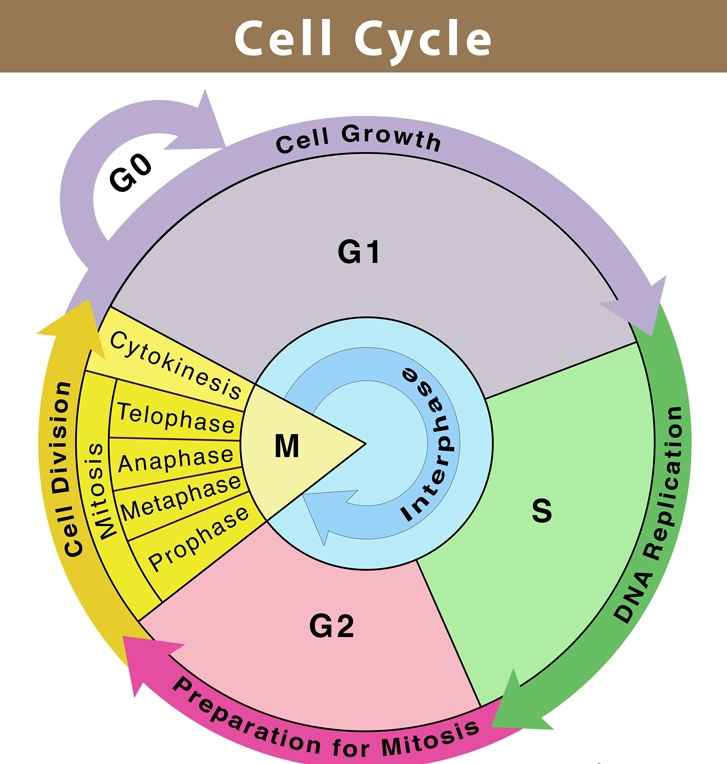Chemotherapy involves the use of antineoplastic drugs in an attempt to destroy cancer cells by interfering with cellular functions, including replication and DNA repair .
Chemo drugs destroy only the fastest growing cells e.g. Bone marrow, Hairs, Germ cells and cancer cells.
Reproduction of both healthy and malignant cells follows the cell cycle pattern .The cell cycle time is the time required for one cell to divide and reproduce two identical daughter cells. The cell cycle of any cell has four distinct phases, each with a vital underlying function:-
G₁ phase - RNA and protein synthesis occurs
S phase - DNA synthesis occurs
G2 phase - premitotic phase; DNA synthesis is complete, mitotic spindle forms
Mitosis - duplicated chromosomes separate and cell division occurs cycle
Types of chemotherapeutic agents :-
1 . Cell cycle specific agents :- These agents destroy cells that are actively reproducing by means of cell cycle, most affect cell cycle in the S phase by interfering with DNA and RNA synthesis .
2. Cell cycle non specific agents :- These agents usually have a prolonged effects on cells leading to cellular damage or death.
On the basis of chemical group
1. Alkylating agents
2. Nitrosoureas
3. Topoisomerase I inhibitors
Topoisomerase II inhibitors
4. Antimetabolites
5.Antitumor Antibiotics
6.Mitotic Spindle Inhibitors
7.Hormonal agents
8. Miscellaneous agents
Routes of chemotherapy
1. IV route
A. Peripheral access :- large vein of fore arm is preffered vein for peripheral line.
- Avoid the IV line over the dorsal aspect of hand and area of flexion such as elbow / wrist joint.
- Avoid line in impaired lymphatic drainage phlebitis, invading Neoplasm and Hematoma.
B. Vascular access device :-
a. CVP line
b. PICC Line ( Peripheral inserted central catheter)
c. Chemoport
DOSE CALCULATION :-
The dosage of chemotherapeutic agents is based primarily on the patient's total body surface area, weight, previous exposure and response to chemotherapy or radiation therapy, and function of major organ systems.
BSA =(Height in cm x weight in kg) / 1000
COMPLICATION OF IV CHEMOTHERAPY
1. Extravasation :-
Intravenously given chemotherapy agents are additionally classified by their potential to damage tissue if they inadvertently leak from a vein into surrounding tissue (extravasation) .
vesicants drug when deposited in subcutaneous tissue cause tissue inflammation,damage underlying tenden, Nerves & Blood vessels.
e.g. Dectinomycin, Daunorubicin, Doxorubicine and vincristine.
Irritant drug can produce venous pain at the site and along the vein.
Management of extravasation :-
- Stop IV administration
- Remove the line
- observe site regularly for pain, swelling redness, induration and erythema ( Follow VIP score)
- Document the appearance of site before and after chemotherapy
2.Hypersensitivity Reactions :-
HSRs are a subgroup of adverse drug reactions that are unexpected and associated with mild or progressively worsening signs and symptoms, such as rash, urticaria, fever, hypotension, cardiac instability, dyspnea, wheezing, throat tightness, and syncope.
Precautions
If HSRs occur , the medication should be discontinued immediately and emergency protocols initiated.
For some chemotherapeutic agents, especially if they are essential in the treatment plan
- Desensitization procedures may be possible
- The patient is retreated with the agent at reduced dosage or slower infusion rates.
- Premedication regimens are used for certain chemotherapy agents to prevent or minimize reactions.
Care during chemotherapy :-
1.Antiemetic drug should be given 6 to 12 hrs before chemotherapy to prevent nausea and vomiting.
2.Observe for any hypersensitivity reaction occurs
3.Vital monitoring
4.Assess for nutritional status and if patient unable to take orally than start parenteral nutrition.
5. Avoid to much hot Or cold food, citrus food, spicy food.
6. Start antibiotic as prescribed to prevent Infection.
7..Hand hygiene and mask.
8..If Anemia occurs
- provide proper rest
- Dietary modification
- Blood transfusion if needed.
9.If Thrombocytopenia occurs
- Avoid needle puncture Or I'M injection
- Avoid rectal temperature
- Compressed IM site for 5 mins.
10. If stomatitis / Mucositis
- Oral care
- Dental care
Important points
* Drug of choice for CINV (chemotherapy induced nausea and vomiting) are 5- hydroxytryptane and Dopamine receptors.
* Antimetabolites and antitumor antibiotics are the major culprit in mucositis.
* Myelosupression ( Depression of bone marrow function) resulting decrease WBCs(leukopenia), Granulocytes (Neutropenia), Red blood cells (Anemia), and platelets (Thrombocytopenia).
* SIADH - Syndrome of inappropriate secretion of antidiuretic hormone.
* MESNA is the drug of choice for prevent Hemorrhagic cystitis result from cyclophosphamide Or iphosphamide therapy.
* CIN - Chemotherapy induced neurotoxicity.
* Chemo brain /chemo fog :- The term commonly referred to describe cognitive impairment has been associated with both cancer and cancer treatment including surgery, radiation, chemotherapy, and targeted agents















0 Comments